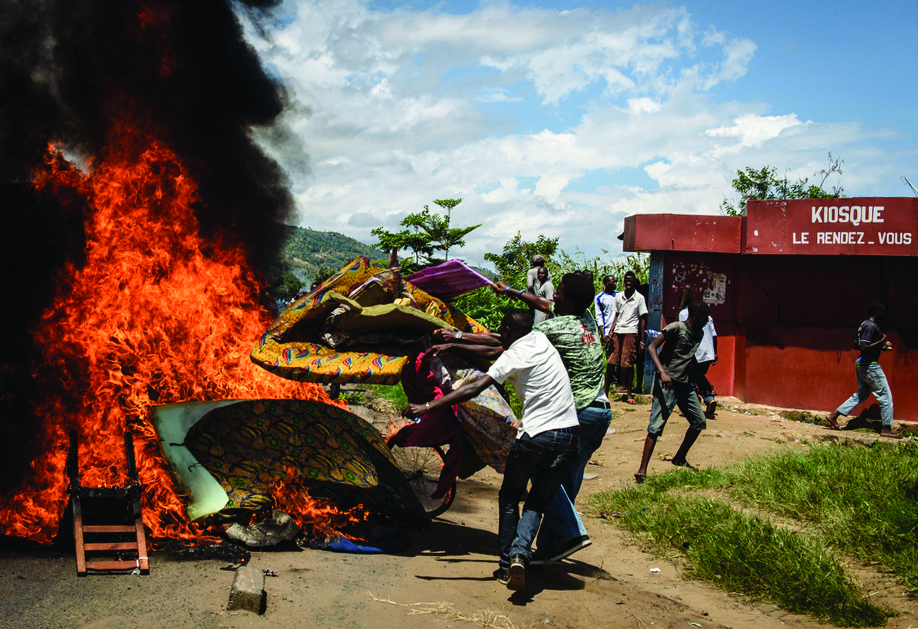Burundi has been rocked by gunfire, protests and an attempted coup. At least 20 people are feared dead and hundreds of thousands are on the run since the skirmishes began in April.
Protests in East Africa’s smallest country began in the capital Bujumbura on April 25 after President Pierre Nkurunziza announced he was seeking a third term in office, despite a two-term limit in the constitution.

QUALITY REPEAT
A Burundian police officer holding a baton and army forces run after protestors throwing stones during a demonstration against incumbent president Pierre Nkurunziza’s bid for a third term on May 13, 2015 in Bujumbura. In the neighborhood of Musaga, hundreds of people waved sticks and threw stones as police responded with tear gas, a water cannon and live rounds. Protestors looted the local police post in Musaga, burning furniture, mattresses and clothing in a barricade fire, an AFP photographer said. Burundi’s presidency said an attempted coup by a top general had “failed” on May 13, 2015 and pro-president Burundi troops at state broadcaster fire warning shots over the heads of hundreds of protesters, an AFP reporter said. Burundian general Godefroid Niyombare on May 13 announced the overthrow of President Pierre Nkurunziza, following weeks of violent protests against the president’s bid to stand for a third term. AFP PHOTO / JENNIFER HUXTA
Protestors immediately barricaded roads and set tyres alight. Since then, there have been daily riots in the capital.
The air is full of tension as army and police officials patrol the streets.
Loading...
A group, led by Godefroid Niyombare, even attempted to overthrow the government while Nkurunziza was in Tanzania for talks with regional leaders on the crisis in his country. Despite initially claiming success, the coup failed, and many of its leaders were arrested. Niyombare remains on the run.
On May 5, the Constitutional Court said that Nkurunziza is eligible for a third term in office after four judges fled the country fearing for their safety. The court stated Nkurunziza’s first term does not count because he was appointed by parliament, not the citizens of Burundi.
Nkurunziza took office 10 years ago after the end of a 12-year civil war. Following a peace agreement in 2005 in Arusha, Tanzania, it was decided that no president will run for more than two terms.
International governments have expressed concern over the court’s decision.
“The eyes of the world are on Burundi. The steps necessary for a peaceful and prosperous democratic future for Burundi should be taken now,” Britain said in a statement.
“Reports of intimidation against members of the Constitutional Court do not give the impression of an independent court that was able to come to an impartial decision.”
“We are deeply concerned about President Nkurunziza’s decision, which flies directly in the face of the constitution of his country,” US Secretary of State, John Kerry, said during a visit to Kenya.
Many fear that civil war will return.
The country has been plagued with tension since it gained independence from Belgium in 1962. The civil war, fought between the country’s Hutu majority and Tutsi minority, began in 1993 and resulted in the death of around 300,000 people.

Burundi’s President Pierre Nkurunziza talks to the media at the President’s office in Bujumbura on May 17, 2015 as he made his first official appearance since an attempted coup against him this week. Nkurunziza has been facing weeks of violent and deadly street protests over his controversial bid to stand for a third consecutive term on office, and on Wednesday top generals announced they were overthrowing him while he was on a visit to neighbouring Tanzania. AFP PHOTO / CARL DE SOUZA
With the presidential elections slated for June 26, Nkurunziza continues to defy international pressure to withdraw from the elections. Furthermore, the president has rejected calls to delay the elections, saying that it “would worsen the current situation”.
So far, Belgium has suspended the $2.2 million it had pledged for Burundi’s elections and the Netherlands says it is reviewing its commitment to the country.
The current government remains hopeful that peaceful and fair elections will still be held.
Since the protests began, more than 100,000 Burundians have fled to neighboring countries Rwanda, Tanzania and the Democratic Republic of Congo. Many fear the ruling party’s youth wing militia ‘Imbonerakure’, according to the UN refugee agency.
The European Commission has disbursed $1.7 million to support and protect Burundian refugees in neighboring countries.
“Such sudden and massive displacement is a humanitarian tragedy and a serious challenge to neighboring countries’ capacities to accommodate refugees. It is a serious concern in an already fragile region,” EU Commissioner for Humanitarian Aid and Crisis Management, Christos Stylianides, said.
Burundi’s economy has grown by more than 4% annually since 2012 despite several constraints.
Last year, the International Monetary Fund (IMF) warned that the country’s medium term economic outlook remains bleak with risks arising from political uncertainties ahead of the general elections and ‘vulnerability to external shocks given Burundi’s narrow export base’.
According to Venuste Karambazi, an independent analyst based in Rwanda, Nkurunziza’s decision to run for office will put a damper on the struggling economy.
“Burundi is a poor country, so when there are riots, like the case now, these contribute to weakening the economy more and more. The capital is paralyzed, trade is paralyzed and other social activities come to a stop. This is a danger to the economy which is already weak. If the situation continues, we risk having a Burundian economy that is destroyed,” Karambazi said.
Loading...
